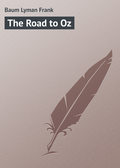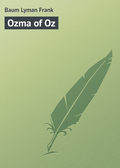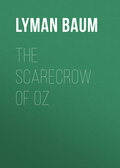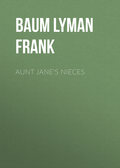
Лаймен Фрэнк Баум
Rinkitink in Oz
The Three Pearls
CHAPTER 5
When King Rinkitink and Prince Inga had bathed themselves in the sea and eaten a simple breakfast, they began wondering what they could do to improve their condition.
"The poor people of Gilgad," said Rinkitink cheerfully, "are little likely ever again to behold their King in the flesh, for my boat and my rowers are gone with everything else. Let us face the fact that we are imprisoned for life upon this island, and that our lives will be short unless we can secure more to eat than is in this small sack."
"I'll not starve, for I can eat grass," remarked the goat in a pleasant tone – or a tone as pleasant as Bilbil could assume.
"True, quite true," said the King. Then he seemed thoughtful for a moment and turning to Inga he asked: "Do you think, Prince, that if the worst comes, we could eat Bilbil?"
The goat gave a groan and cast a reproachful look at his master as he said:
"Monster! Would you, indeed, eat your old friend and servant?"
"Not if I can help it, Bilbil," answered the King pleasantly. "You would make a remarkably tough morsel, and my teeth are not as good as they once were."
While this talk was in progress Inga suddenly remembered the three pearls which his father had hidden under the tiled floor of the banquet hall. Without doubt King Kitticut had been so suddenly surprised by the invaders that he had found no opportunity to get the pearls, for otherwise the fierce warriors would have been defeated and driven out of Pingaree. So they must still be in their hiding place, and Inga believed they would prove of great assistance to him and his comrades in this hour of need. But the palace was a mass of ruins; perhaps he would be unable now to find the place where the pearls were hidden.
He said nothing of this to Rinkitink, remembering that his father had charged him to preserve the secret of the pearls and of their magic powers. Nevertheless, the thought of securing the wonderful treasures of his ancestors gave the boy new hope.
He stood up and said to the King:
"Let us return to the other end of Pingaree. It is more pleasant than here in spite of the desolation of my father's palace. And there, if anywhere, we shall discover a way out of our difficulties."
This suggestion met with Rinkitink's approval and the little party at once started upon the return journey. As there was no occasion to delay upon the way, they reached the big end of the island about the middle of the day and at once began searching the ruins of the palace.
They found, to their satisfaction, that one room at the bottom of a tower was still habitable, although the roof was broken in and the place was somewhat littered with stones. The King was, as he said, too fat to do any hard work, so he sat down on a block of marble and watched Inga clear the room of its rubbish. This done, the boy hunted through the ruins until he discovered a stool and an armchair that had not been broken beyond use. Some bedding and a mattress were also found, so that by nightfall the little room had been made quite comfortable.
The following morning, while Rinkitink was still sound asleep and Bilbil was busily cropping the dewy grass that edged the shore, Prince Inga began to search the tumbled heaps of marble for the place where the royal banquet hall had been. After climbing over the ruins for a time he reached a flat place which he recognized, by means of the tiled flooring and the broken furniture scattered about, to be the great hall he was seeking. But in the center of the floor, directly over the spot where the pearls were hidden, lay several large and heavy blocks of marble, which had been torn from the dismantled walls.
This unfortunate discovery for a time discouraged the boy, who realized how helpless he was to remove such vast obstacles; but it was so important to secure the pearls that he dared not give way to despair until every human effort had been made, so he sat him down to think over the matter with great care.
Meantime Rinkitink had risen from his bed and walked out upon the lawn, where he found Bilbil reclining at ease upon the greensward.
"Where is Inga?" asked Rinkitink, rubbing his eyes with his knuckles because their vision was blurred with too much sleep.
"Don't, ask me," said the goat, chewing with much satisfaction a cud of sweet grasses.
"Bilbil," said the King, squatting down beside the goat and resting his fat chin upon his hands and his elbows on his knees, "allow me to confide to you the fact that I am bored, and need amusement. My good friend Kitticut has been kidnapped by the barbarians and taken from me, so there is no one to converse with me intelligently. I am the King and you are the goat. Suppose you tell me a story."
"Suppose I don't," said Bilbil, with a scowl, for a goat's face is very expressive.
"If you refuse, I shall be more unhappy than ever, and I know your disposition is too sweet to permit that. Tell me a story, Bilbil."
The boat looked at him with an expression of scorn. Said he:
"One would think you are but four years old, Rinkitink! But there – I will do as you command. Listen carefully, and the story may do you some good – although I doubt if you understand the moral."
"I am sure the story will do me good," declared the King, whose eyes were twinkling.
"Once on a time," began the goat.
"When was that, Bilbil?" asked the King gently.
"Don't interrupt; it is impolite. Once on a time there was a King with a hollow inside his head, where most people have their brains, and – "
"Is this a true story, Bilbil?"
"And the King with a hollow head could chatter words, which had no sense, and laugh in a brainless manner at senseless things. That part of the story is true enough, Rinkitink."
"Then proceed with the tale, sweet Bilbil. Yet it is hard to believe that any King could be brainless – unless, indeed, he proved it by owning a talking goat."
Bilbil glared at him a full minute in silence. Then he resumed his story:
"This empty-headed man was a King by accident, having been born to that high station. Also the King was empty-headed by the same chance, being born without brains."
"Poor fellow!" quoth the King. "Did he own a talking goat?"
"He did," answered Bilbil.
"Then he was wrong to have been born at all. Cheek-eek-eek-eek, oo, hoo!" chuckled Rinkitink, his fat body shaking with merriment. "But it's hard to prevent oneself from being born; there's no chance for protest, eh, Bilbil?"
"Who is telling this story, I'd like to know," demanded the goat, with anger.
"Ask someone with brains, my boy; I'm sure I can't tell," replied the King, bursting into one of his merry fits of laughter.
Bilbil rose to his hoofs and walked away in a dignified manner, leaving Rinkitink chuckling anew at the sour expression of the animal's face.
"Oh, Bilbil, you'll be the death of me, some day – I'm sure you will!" gasped the King, taking out his lace handkerchief to wipe his eyes; for, as he often did, he had laughed till the tears came.
Bilbil was deeply vexed and would not even turn his head to look at his master. To escape from Rinkitink he wandered among the ruins of the palace, where he came upon Prince Inga.
"Good morning, Bilbil," said the boy. "I was just going to find you, that I might consult you upon an important matter. If you will kindly turn back with me I am sure your good judgment will be of great assistance."
The angry goat was quite mollified by the respectful tone in which he was addressed, but he immediately asked:
"Are you also going to consult that empty-headed King over yonder?"
"I am sorry to hear you speak of your kind master in such a way," said the boy gravely. "All men are deserving of respect, being the highest of living creatures, and Kings deserve respect more than others, for they are set to rule over many people."
"Nevertheless," said Bilbil with conviction, "Rinkitink's head is certainly empty of brains."
"That I am unwilling to believe," insisted Inga. "But anyway his heart is kind and gentle and that is better than being wise. He is merry in spite of misfortunes that would cause others to weep and he never speaks harsh words that wound the feelings of his friends."
"Still," growled Bilbil, "he is – "
"Let us forget everything but his good nature, which puts new heart into us when we are sad," advised the boy.
"But he is – "
"Come with, me, please," interrupted Inga, "for the matter of which I wish to speak is very important."
Bilbil followed him, although the boy still heard the goat muttering that the King had no brains. Rinkitink, seeing them turn into the ruins, also followed, and upon joining them asked for his breakfast.
Inga opened the sack of food and while he and the King ate of it the boy said:
"If I could find a way to remove some of the blocks of marble which have fallen in the banquet hall, I think I could find means for us to escape from this barren island."
"Then," mumbled Rinkitink, with his mouth full, "let us move the blocks of marble."
"But how?" inquired Prince Inga. "They are very heavy."
"Ah, how, indeed?" returned the King, smacking his lips contentedly. "That is a serious question. But – I have it! Let us see what my famous parchment says about it." He wiped his fingers upon a napkin and then, taking the scroll from a pocket inside his embroidered blouse, he unrolled it and read the following words: "'Never step on another man's toes.'"
The goat gave a snort of contempt; Inga was silent; the King looked from one to the other inquiringly.
"That's the idea, exactly!" declared Rinkitink.
"To be sure," said Bilbil scornfully, "it tells us exactly how to move the blocks of marble."
"Oh, does it?" responded the King, and then for a moment he rubbed the top of his bald head in a perplexed manner. The next moment he burst into a peal of joyous laughter. The goat looked at Inga and sighed.
"What did I tell you?" asked the creature. "Was I right, or was I wrong?"
"This scroll," said Rinkitink, "is indeed a masterpiece. Its advice is of tremendous value. 'Never step on another man's toes.' Let us think this over. The inference is that we should step upon our own toes, which were given us for that purpose. Therefore, if I stepped upon another man's toes, I would be the other man. Hoo, hoo, hoo! – the other man – hee, hee, heek-keek-eek! Funny, isn't it?"
"Didn't I say – " began Bilbil.
"No matter what you said, my boy," roared the King. "No fool could have figured that out as nicely as I did."
"We have still to decide how to remove the blocks of marble," suggested Inga anxiously.
"Fasten a rope to them, and pull," said Bilbil.
"Don't pay any more attention to Rinkitink, for he is no wiser than the man who wrote that brainless scroll. Just get the rope, and we'll fasten Rinkitink to one end of it for a weight and I'll help you pull."
"Thank you, Bilbil," replied the boy. "I'll get the rope at once."
Bilbil found it difficult to climb over the ruins to the floor of the banquet hall, but there are few places a goat cannot get to when it makes the attempt, so Bilbil succeeded at last, and even fat little Rinkitink finally joined them, though much out of breath.
Inga fastened one end of the rope around a block of marble and then made a loop at the other end to go over Bilbil's head. When all was ready the boy seized the rope and helped the goat to pull; yet, strain as they might, the huge block would not stir from its place. Seeing this, King Rinkitink came forward and lent his assistance, the weight of his body forcing the heavy marble to slide several feet from where it had lain.
But it was hard work and all were obliged to take a long rest before undertaking the removal of the next block.
"Admit, Bilbil," said the King, "that I am of some use in the world."
"Your weight was of considerable help," acknowledged the goat, "but if your head were as well filled as your stomach the task would be still easier."
When Inga went to fasten the rope a second time he was rejoiced to discover that by moving one more block of marble he could uncover the tile with the secret spring. So the three pulled with renewed energy and to their joy the block moved and rolled upon its side, leaving Inga free to remove the treasure when he pleased.
But the boy had no intention of allowing Bilbil and the King to share the secret of the royal treasures of Pingaree; so, although both the goat and its master demanded to know why the marble blocks had been moved, and how it would benefit them, Inga begged them to wait until the next morning, when he hoped to be able to satisfy them that their hard work had not been in vain.
Having little confidence in this promise of a mere boy, the goat grumbled and the King laughed; but Inga paid no heed to their ridicule and set himself to work rigging up a fishing rod, with line and hook. During the afternoon he waded out to some rocks near the shore and fished patiently until he had captured enough yellow perch for their supper and breakfast.
"Ah," said Rinkitink, looking at the fine catch when Inga returned to the shore; "these will taste delicious when they are cooked; but do you know how to cook them?"
"No," was the reply. "I have often caught fish, but never cooked them. Perhaps Your Majesty understands cooking."
"Cooking and majesty are two different things," laughed the little King. "I could not cook a fish to save me from starvation."
"For my part," said Bilbil, "I never eat fish, but I can tell you how to cook them, for I have often watched the palace cooks at their work." And so, with the goat's assistance, the boy and the King managed to prepare the fish and cook them, after which they were eaten with good appetite.
That night, after Rinkitink and Bilbil were both fast asleep, Inga stole quietly through the moonlight to the desolate banquet hall. There, kneeling down, he touched the secret spring as his father had instructed him to do and to his joy the tile sank downward and disclosed the opening. You may imagine how the boy's heart throbbed with excitement as he slowly thrust his hand into the cavity and felt around to see if the precious pearls were still there. In a moment his fingers touched the silken bag and, without pausing to close the recess, he pressed the treasure against his breast and ran out into the moonlight to examine it. When he reached a bright place he started to open the bag, but he observed Bilbil lying asleep upon the grass near by. So, trembling with the fear of discovery, he ran to another place, and when he paused he heard Rinkitink snoring lustily. Again he fled and made his way to the seashore, where he squatted under a bank and began to untie the cords that fastened the mouth of the bag. But now another fear assailed him.
"If the pearls should slip from my hand," he thought, "and roll into the water, they might be lost to me forever. I must find some safer place."
Here and there he wandered, still clasping the silken bag in both hands, and finally he went to the grove and climbed into the tall tree where he had made his platform and seat. But here it was pitch dark, so he found he must wait patiently until morning before he dared touch the pearls. During those hours of waiting he had time for reflection and reproached himself for being so frightened by the possession of his father's treasures.
"These pearls have belonged to our family for generations," he mused, "yet no one has ever lost them. If I use ordinary care I am sure I need have no fears for their safety."
When the dawn came and he could see plainly, Inga opened the bag and took out the Blue Pearl. There was no possibility of his being observed by others, so he took time to examine it wonderingly, saying to himself: "This will give me strength."
Taking off his right shoe he placed the Blue Pearl within it, far up in the pointed toe. Then he tore a piece from his handkerchief and stuffed it into the shoe to hold the pearl in place. Inga's shoes were long and pointed, as were all the shoes worn in Pingaree, and the points curled upward, so that there was quite a vacant space beyond the place where the boy's toes reached when the shoe was upon his foot.
After he had put on the shoe and laced it up he opened the bag and took out the Pink Pearl. "This will protect me from danger," said Inga, and removing the shoe from his left foot he carefully placed the pearl in the hollow toe. This, also, he secured in place by means of a strip torn from his handkerchief.
Having put on the second shoe and laced it up, the boy drew from the silken bag the third pearl – that which was pure white – and holding it to his ear he asked:
"Will you advise me what to do, in this my hour of misfortune?"
Clearly the small voice of the pearl made answer:
"I advise you to go to the Islands of Regos and Coregos, where you may liberate your parents from slavery."
"How could I do that?" exclaimed Prince Inga, amazed at receiving such advice.
"To-night," spoke the voice of the pearl, "there will be a storm, and in the morning a boat will strand upon the shore. Take this boat and row to Regos and Coregos."
"How can I, a weak boy, pull the boat so far?" he inquired, doubting the possibility.
"The Blue Pearl will give you strength," was the reply.
"But I may be shipwrecked and drowned, before ever I reach Regos and Coregos," protested the boy.
"The Pink Pearl will protect you from harm," murmured the voice, soft and low but very distinct.
"Then I shall act as you advise me," declared Inga, speaking firmly because this promise gave him courage, and as he removed the pearl from his ear it whispered:
"The wise and fearless are sure to win success."
Restoring the White Pearl to the depths of the silken bag, Inga fastened it securely around his neck and buttoned his waist above it to hide the treasure from all prying eyes. Then he slowly climbed down from the tree and returned to the room where King Rinkitink still slept.
The goat was browsing upon the grass but looked cross and surly. When the boy said good morning as he passed, Bilbil made no response whatever. As Inga entered the room the King awoke and asked:
"What is that mysterious secret of yours? I've been dreaming about it, and I haven't got my breath yet from tugging at those heavy blocks. Tell me the secret."
"A secret told is no longer a secret," replied Inga, with a laugh. "Besides, this is a family secret, which it is proper I should keep to myself. But I may tell you one thing, at least: We are going to leave this island to-morrow morning."
The King seemed puzzled by this statement.
"I'm not much of a swimmer," said he, "and, though I'm fat enough to float upon the surface of the water, I'd only bob around and get nowhere at all."
"We shall not swim, but ride comfortably in a boat," promised Inga.
"There isn't a boat on this island!" declared Rinkitink, looking upon the boy with wonder.
"True," said Inga. "But one will come to us in the morning." He spoke positively, for he had perfect faith in the promise of the White Pearl; but Rinkitink, knowing nothing of the three marvelous jewels, began to fear that the little Prince had lost his mind through grief and misfortune.
For this reason the King did not question the boy further but tried to cheer him by telling him witty stories. He laughed at all the stories himself, in his merry, rollicking way, and Inga joined freely in the laughter because his heart had been lightened by the prospect of rescuing his dear parents. Not since the fierce warriors had descended upon Pingaree had the boy been so hopeful and happy.
With Rinkitink riding upon Bilbil's back, the three made a tour of the island and found in the central part some bushes and trees bearing ripe fruit. They gathered this freely, for – aside from the fish which Inga caught – it was the only food they now had, and the less they had, the bigger Rinkitink's appetite seemed to grow.
"I am never more happy," said he with a sigh, "than when I am eating."
Toward evening the sky became overcast and soon a great storm began to rage. Prince Inga and King Rinkitink took refuge within the shelter of the room they had fitted up and there Bilbil joined them. The goat and the King were somewhat disturbed by the violence of the storm, but Inga did not mind it, being pleased at this evidence that the White Pearl might be relied upon.
All night the wind shrieked around the island; thunder rolled, lightning flashed and rain came down in torrents. But with morning the storm abated and when the sun arose no sign of the tempest remained save a few fallen trees.







